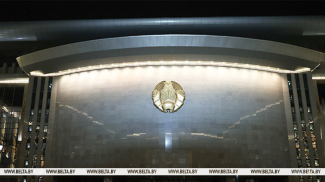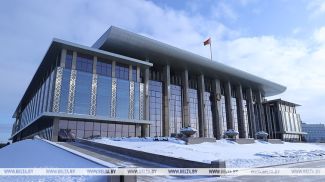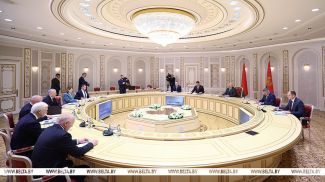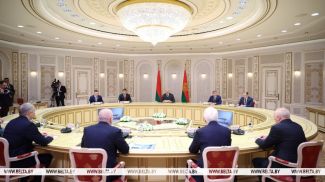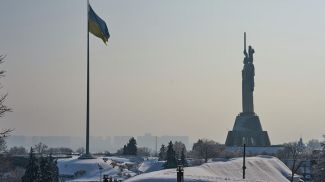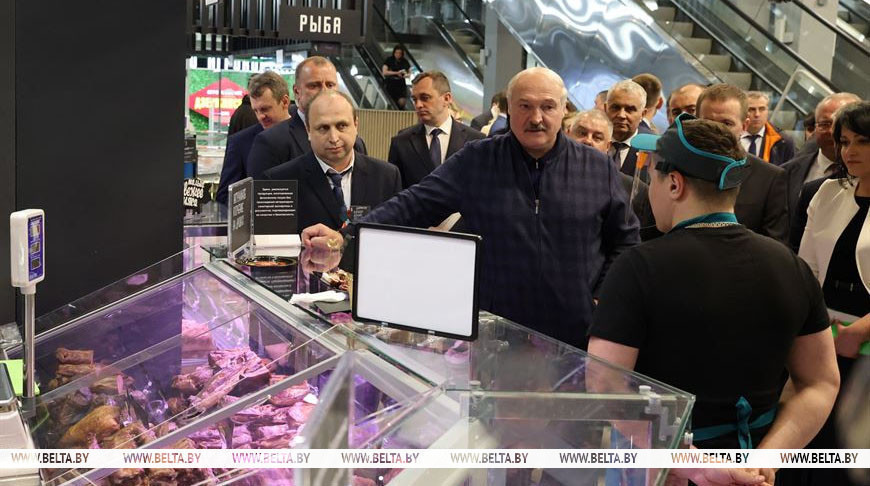
In one of our episodes, we have talked about Belarus’ food security. Indeed, many people are still surprised that our country supplies food to more than 100 countries, with food exports exceeding $8 billion. These figures speak of one thing - the quality of Belarusian goods. Be sure to watch that episode. We broke it down for you and also found out what Aleksandr Lukashenko grows in his garden and why he started experimental fields. Today we will also talk about food and find out why the Belarusian president urges "not to fall for foreign-made goods’ and what he sees as the secret of longevity. How IT people become farmers and where to find the most organic Belarusian products.
What does Lukashenko grow in his garden?
We all know that healthy nutrition is the key to our health. But a balanced diet isn't everything. Aleksandr Lukashenko, for example, is an avid locavore.
Probably, this is why the president has a large farm and a garden. He grows potatoes and other vegetables, melons and berries, apples… His farm breeds horses and cows, goats and sheep, rabbits and poultry.
At the height of the coronavirus pandemic, Aleksandr Lukashenko stressed: "Given that we will live together with the viruses (I don't know which ones there will be in the future), we need to take care of ourselves and our lives. Work more, eat normally. I have repeatedly called on you to eat locally products grown on our land rather than some overseas stuff."
The president said that he does not eat imported products. What for? After all, the countries grows potatoes, carrots, and cabbage. "We produce everything. Meat and dairy products are the best in the world. Therefore, you should eat locally. This is my advice to you," he said as he talked with residents of Mogilev in 2021.
A few days on, in an interview with the Russian National Defense magazine, the head of state revealed the secret of longevity: "Never eat anything imported and you will live a long time."
Aleksandr Lukashenko regularly returns to this topic. At a meeting on pricing matters in February 2023, he again drew the attention of Belarusians: "There can be no better potatoes, cabbage, carrots and onions than those grown on our land where we were born and where we live."
State of farming in Belarus
Interest in organic homemade products is growing all over the world, including in Belarus. Over the past couple of years, the number of farms in our country has increased significantly. This means that there is a demand.
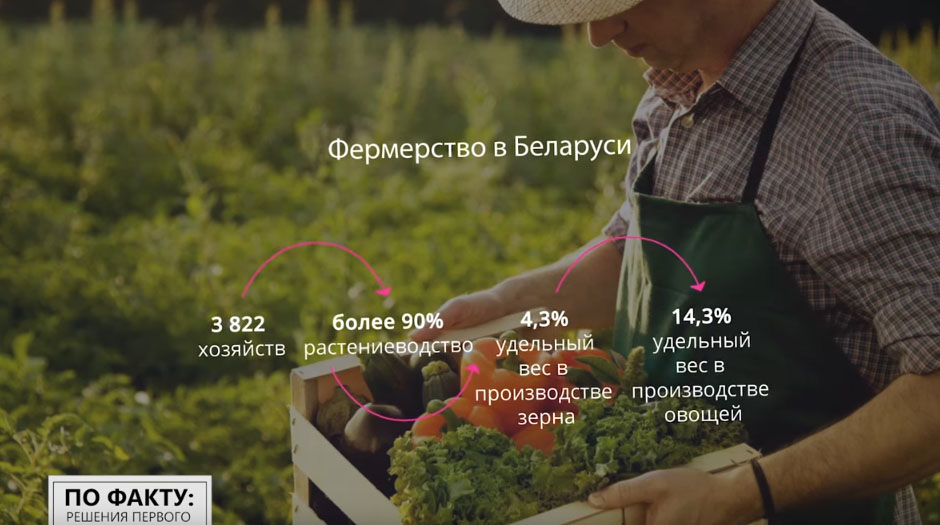
In terms of volumes, they cannot compete with large agricultural holding companies and their contribution to the total food output is small. For example, farms produce 4.3% of grain, 14.8% of potatoes, 14.3% of vegetables. Nevertheless, the state is interested in the dynamic development of this sector.
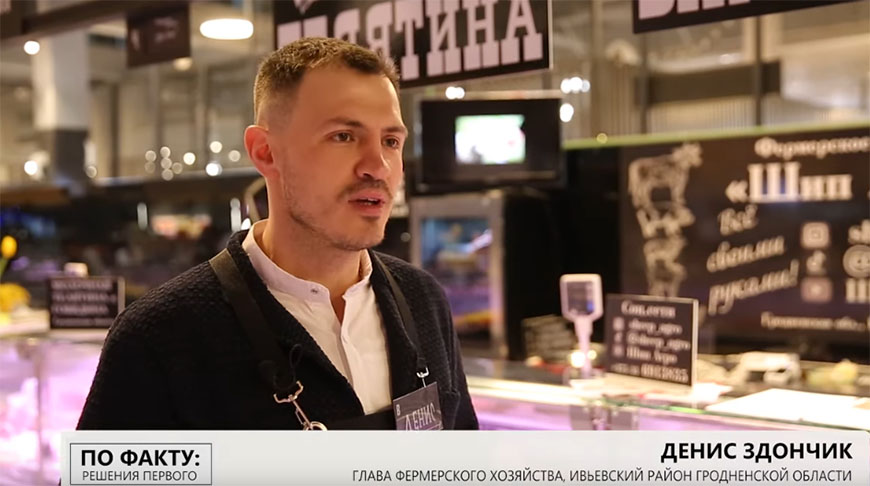
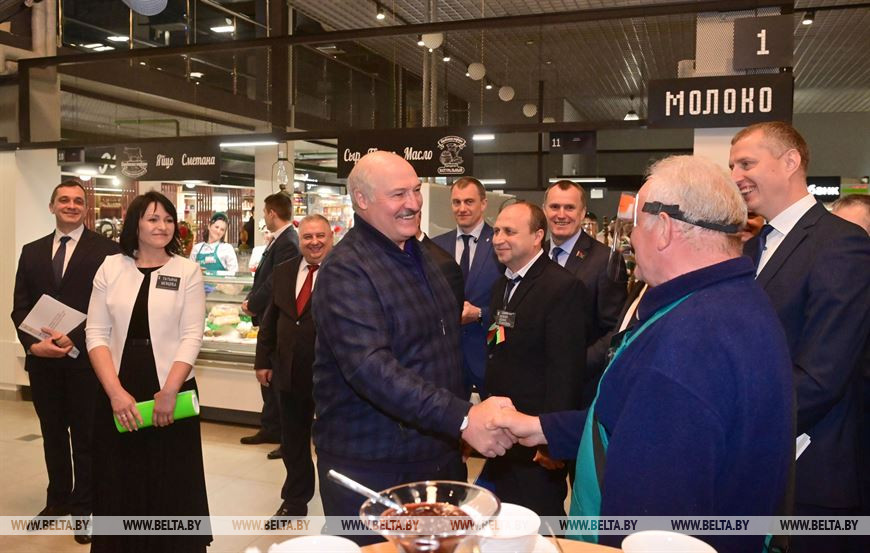
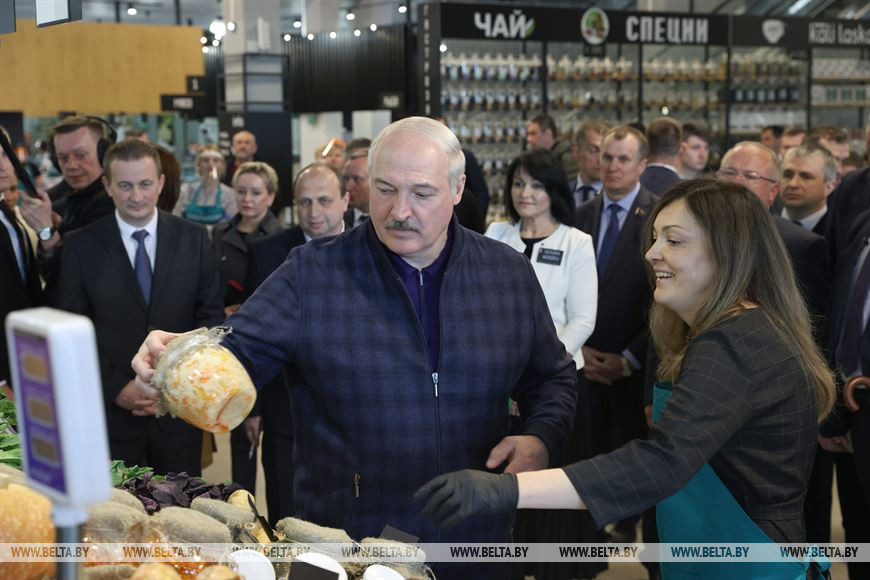
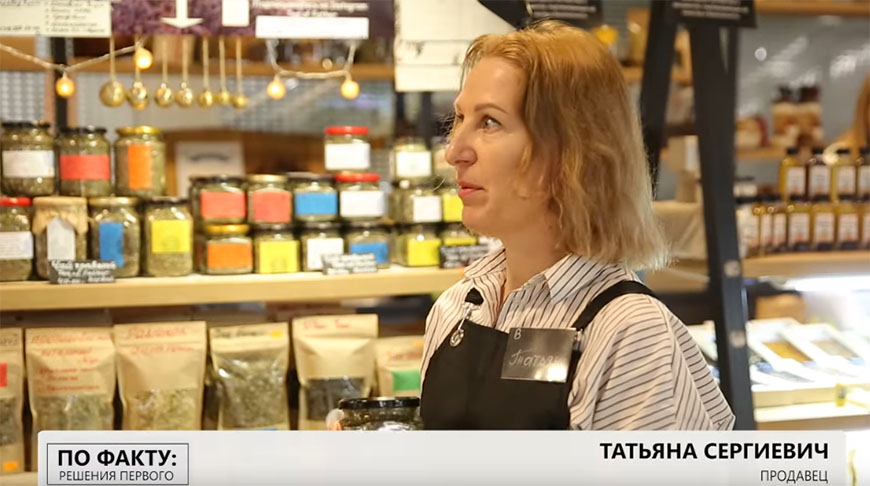
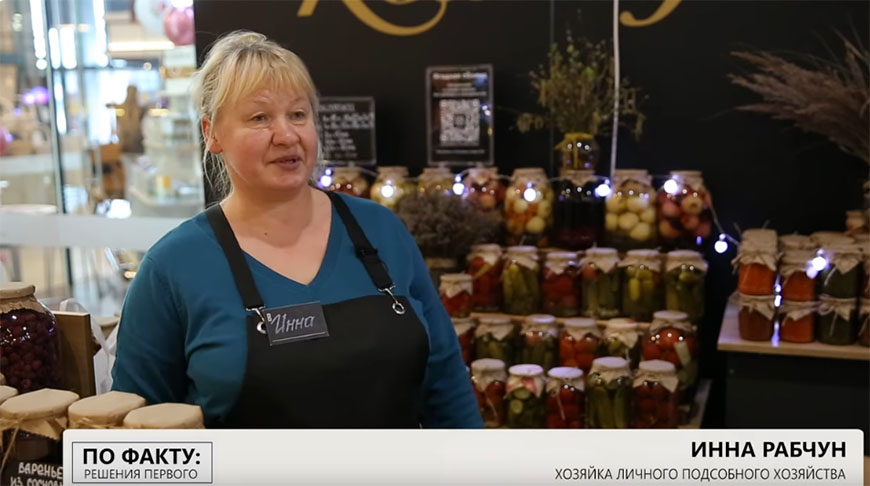
Inna Rabchun’s farm is in Logoisk District, close to a forest. Wild animals are not a rare thing here.
“We have bears in Logoisk District. A bear keeps coming to our garden. One day I saw my garden trampled all over. Neighbors said they saw a bear here,” she said.
Her son does the planting, and her daughter helps with selling. Inna makes jam.
This is not some mass production. “It is a bit difficult, because for the second straight year I have been cooking from 8 in the morning till 9 at night. We are doing our best. Everything we have is homemade, organic, and fresh. I have tried to make it large-scale, but the taste, color and quality differed a lot,” she said.
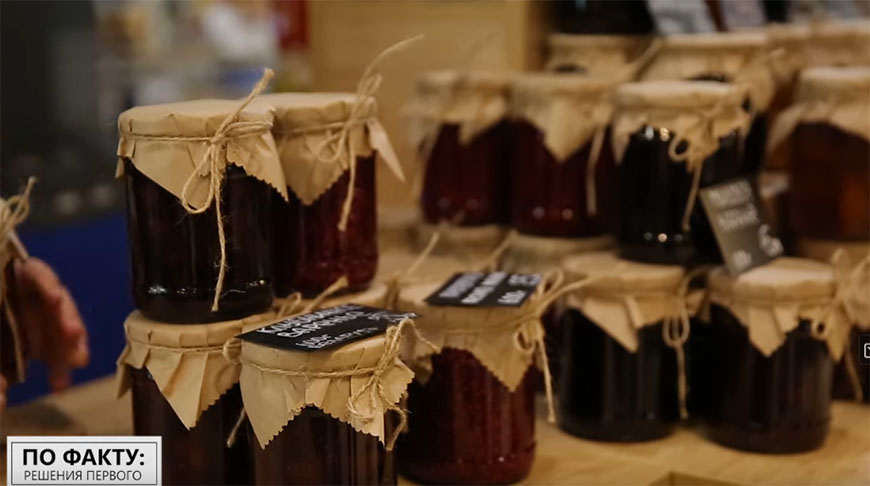
What gifts does Lukashenko bring to other presidents?
Another fact speaks volumes about the quality of Belarusian food products. During foreign visits Aleksandr Lukashenko always brings gifts to his colleagues. Gifts always vary, but one gift remains unchanged. It is a basket of best Belarusian food products. Vladimir Putin once made a special request. He asked Aleksandr Lukashenko to bring him Belarusian potatoes for his birthday. The president honored the request, and the Russian leader received several sacks with different varieties of potatoes from the head of state's garden, and also a piece of lard.
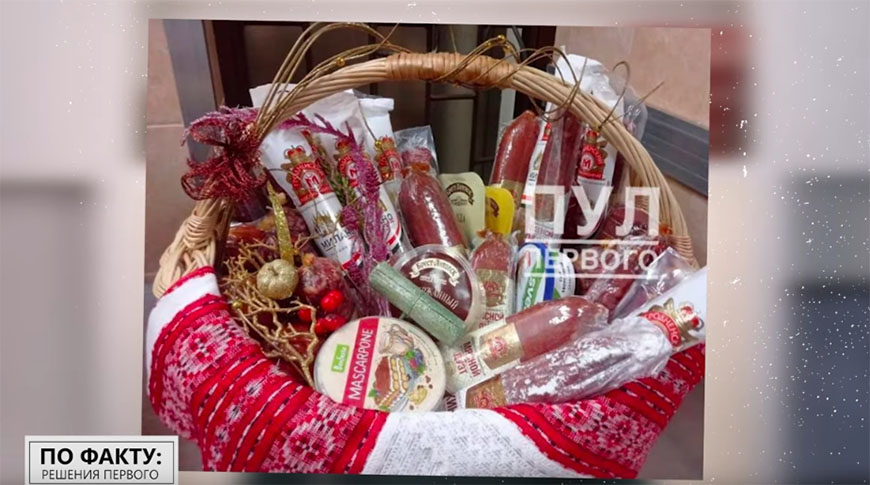
“I always urge you to consume local products and do not hunt for those from overseas. Some, especially young people, lament McDonald’s withdrawal. I think: thank God it is gone! McDonald’s place should be taken by Belarusian producers.” Aleksandr Lukashenko said honoring the best agricultural workers in November 2022.
He added: “We ourselves need to do what McDonald's once did — and do it even better! We know how to cut bread in half and put a piece of meat, fries and salad in it. I struggle to understand why this thing is popular.”
The conclusion is clear. Wherever you shop, be it in a supermarket or a farmers' market, remember the president's advice to eat local food products.
What does Lukashenko grow in his garden?
We all know that healthy nutrition is the key to our health. But a balanced diet isn't everything. Aleksandr Lukashenko, for example, is an avid locavore.
Probably, this is why the president has a large farm and a garden. He grows potatoes and other vegetables, melons and berries, apples… His farm breeds horses and cows, goats and sheep, rabbits and poultry.
At the height of the coronavirus pandemic, Aleksandr Lukashenko stressed: "Given that we will live together with the viruses (I don't know which ones there will be in the future), we need to take care of ourselves and our lives. Work more, eat normally. I have repeatedly called on you to eat locally products grown on our land rather than some overseas stuff."
The president said that he does not eat imported products. What for? After all, the countries grows potatoes, carrots, and cabbage. "We produce everything. Meat and dairy products are the best in the world. Therefore, you should eat locally. This is my advice to you," he said as he talked with residents of Mogilev in 2021.
A few days on, in an interview with the Russian National Defense magazine, the head of state revealed the secret of longevity: "Never eat anything imported and you will live a long time."
Aleksandr Lukashenko regularly returns to this topic. At a meeting on pricing matters in February 2023, he again drew the attention of Belarusians: "There can be no better potatoes, cabbage, carrots and onions than those grown on our land where we were born and where we live."
State of farming in Belarus
Interest in organic homemade products is growing all over the world, including in Belarus. Over the past couple of years, the number of farms in our country has increased significantly. This means that there is a demand.
According to the Agriculture and Food Ministry, as of 1 January 2024, there were 3,822 farms in Belarus, of which 3,364 farms were engaged in agricultural activities. For comparison, in early 2022, there were 3,642 farms in Belarus. Over the past seven years, the number of farms in Belarus has grown by more than 20%.

In terms of volumes, they cannot compete with large agricultural holding companies and their contribution to the total food output is small. For example, farms produce 4.3% of grain, 14.8% of potatoes, 14.3% of vegetables. Nevertheless, the state is interested in the dynamic development of this sector.
“Like I have already said, the climate is changing, so is our approach. We need to grow everything we can and import less. We need to support our producers, no matter how difficult it might be. The global agricultural trend now is making premium-quality organic products using green technologies. Yes, we are proud of the quality of our agricultural products, but we need to make eco-friendly products. We will lead the way. After all, we have the necessary climatic conditions for that,” Aleksandr Lukashenko said in the State of the Nation Address in 2019.
What Belarusian farmers produce
The majority of farms specialize in crop production, which accounts for more than 90% of all products they make. Belarusian farmers cultivate mostly potatoes, vegetables, grains, fruits and berries. Some of them grow crops that are unusual for our country: for example, walnuts.
Many are engaged in the production of meat and dairy products. Of course, farmers cannot compete with agro-industrial holdings, so they focus on niche segments.
Farms differ. Some easily compete with large agricultural organizations, while others are more like a small family business. Their products are popular with consumers. People seek homemade food cooked with heart.
In May 2021 the president visited the farmers’ market in the Valerianovo shopping center. Back then the head of state underlined: “For me, the main thing is the person. I'm a villager. I know what it takes to grow crops and sell them. If we want private farmers to thrive, we must give them the opportunity to grow crops and sell them.”
One of the people featured in our episode (we met him in Valerianovo) became a farmer following the call of his heart. Having received a diploma in software engineering and having worked a little in this field, Denis Zdonchik realized that he was looking for happiness in the wrong place. He moved to the countryside to grow crops. There were challenges, mistakes and disappointments along the way, his business had its ups and downs, and required a lot of painstaking work. Over time, Denis became interested in sheep breeding, and now Minsk residents line up for his lamb grown in his farm in Ivye District, Grodno Oblast.

“When I come to the farm, the first thing I do is inspecting the field, the barn. I need to check how healthy my farm is. In addition to running the farm, I have to be a seller, manager, veterinarian, agronomist, tractor driver. This is hard work. Now the farm has 140 head of breeding stock, about 70 head of lambs for sale in retail outlets. Today I have had a second round of routine checks of the sheep. My grandfather has called me today and said that the first sheep gave birth to twins. This makes me happy,” the farmer said.
“When I come here from a big city, I start breathing with ease. I guess nothing can be better than a rural life if you arrange it in the right way. That is, if you have a job and a home. Belarus is a country of opportunities. Just go ahead and try. I think that producing high-quality, environmentally friendly Belarusian products is a cool thing to do,” he remarked.

We need to clarify something. A farm is a business entity engaged in the production, processing, storage, transportation and sale of agricultural products. Individuals also have the right to sell their harvest and products from it at farmers’ markets: from vegetables and jam, to cheeses and meat products.

For example, Tatiana Sergiyevich sells herbal teas here. “This small project came into being because I had a dream to plant a walnut garden. I needed a land plot for that. And I got it. As this garden was growing, we planted herbs on this land plot. Over time, a lot of good, wonderful herbs grew there. We collected these herbs and used them to make herbal tea. We enjoyed drinking this wonderful, delicious, organic tea. Friends would say: “Guys, this tea is amazing, other people should try it, too.” Foreigners love to take our tea home, as they understand how unique this product is.

Not far away is a stand with homemade jam and tinned products. The owner of the stand is Inna Rabchun.
“We started with eight raspberry seedlings. Within a year, they sprawled to make it eighty. We got even more the following year. A lot went down the drain. We sold some 20% and the rest was just wasted. I got an idea to make jam. I liked it. Then people started showing interest in my jam. Later we started making apple compote. Then we took three hectares of land to make a farm,” she said.
“We started with eight raspberry seedlings. Within a year, they sprawled to make it eighty. We got even more the following year. A lot went down the drain. We sold some 20% and the rest was just wasted. I got an idea to make jam. I liked it. Then people started showing interest in my jam. Later we started making apple compote. Then we took three hectares of land to make a farm,” she said.

Inna Rabchun’s farm is in Logoisk District, close to a forest. Wild animals are not a rare thing here.
“We have bears in Logoisk District. A bear keeps coming to our garden. One day I saw my garden trampled all over. Neighbors said they saw a bear here,” she said.
Her son does the planting, and her daughter helps with selling. Inna makes jam.
This is not some mass production. “It is a bit difficult, because for the second straight year I have been cooking from 8 in the morning till 9 at night. We are doing our best. Everything we have is homemade, organic, and fresh. I have tried to make it large-scale, but the taste, color and quality differed a lot,” she said.

What gifts does Lukashenko bring to other presidents?
Another fact speaks volumes about the quality of Belarusian food products. During foreign visits Aleksandr Lukashenko always brings gifts to his colleagues. Gifts always vary, but one gift remains unchanged. It is a basket of best Belarusian food products. Vladimir Putin once made a special request. He asked Aleksandr Lukashenko to bring him Belarusian potatoes for his birthday. The president honored the request, and the Russian leader received several sacks with different varieties of potatoes from the head of state's garden, and also a piece of lard.

“I always urge you to consume local products and do not hunt for those from overseas. Some, especially young people, lament McDonald’s withdrawal. I think: thank God it is gone! McDonald’s place should be taken by Belarusian producers.” Aleksandr Lukashenko said honoring the best agricultural workers in November 2022.
He added: “We ourselves need to do what McDonald's once did — and do it even better! We know how to cut bread in half and put a piece of meat, fries and salad in it. I struggle to understand why this thing is popular.”
The conclusion is clear. Wherever you shop, be it in a supermarket or a farmers' market, remember the president's advice to eat local food products.




